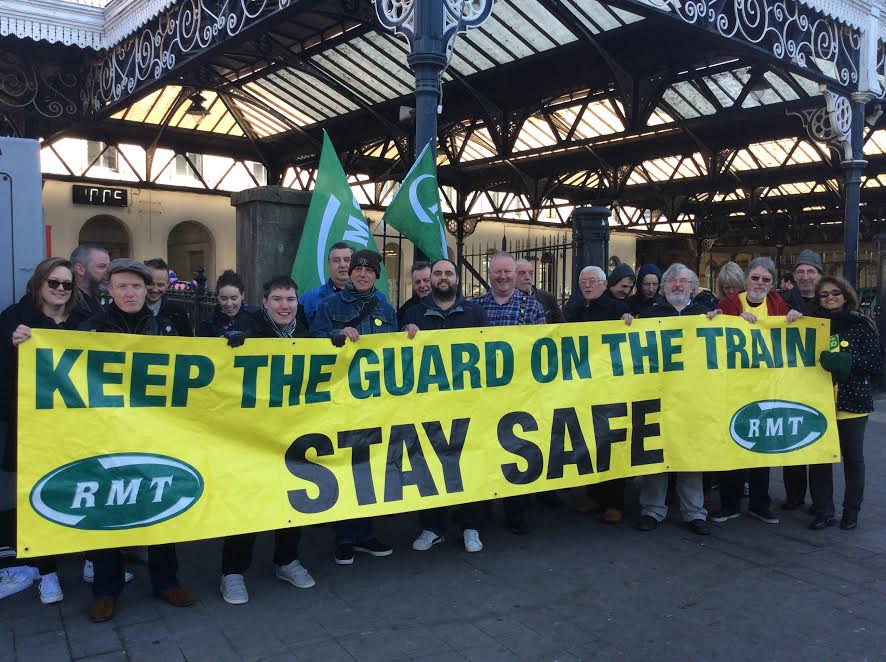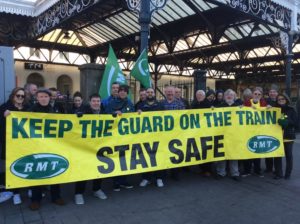Coastway trains to and from Brighton have been the hardest hit by the latest guards’ strike today (Tuesday 3 October) in the long-running dispute with Southern.
Southern – part of Govia Thameslink Railway (GTR) – said that most services would be running as normal.
But the company listed more than 40 services that would be cancelled as a result of the strike – many of them the shuttle between Brighton and Hove stations.
Brighton and Hove Buses is accepting train tickets on a number of services including the 1, 1A, 2, 5, 5A, 5B, 6, 7, 46, 49 and 60 between railway stations.
The strike has been called by the RMT (Rail, Maritime and Transport Workers’ Union) as part of its dispute lasting more than 18 months over the introduction of driver-only operation.
Previously guards or conductors checked that it was safe to close the doors on a train before it pulled out of a station.
Last year Southern started using new trains which were configured so that drivers, using CCTV, could close each train’s doors.
As a result the role of the guard was scrapped in favour of “on-board supervisors”.
Southern has said that the new system means that if a guard is unavailable, a service need not be cancelled, improving reliability for passengers.
But the union said that the guard’s role was about safety – not just when leaving a station but during journeys too – and access for passengers with disabilities.
The union has criticised the on-board supervisor role for being too heavily focused on “revenue protection” – selling tickets or issuing fines to passengers without tickets.
The Association of British Commuters – set up by Brighton-based passengers – has published a series of documents from rail industry bosses flagging up financial savings, the risk of strike action and concerns about access.
Similar disputes have started at other rail companies as they have started making similar changes to those on Southern.
Strikes are taking place at four rail companies in total today – Southern, Arriva Rail North, Greater Anglia and Merseyrail.
Critics of the union have said that driver-only operation has existed safely for many years on services such as Thameslink and the Lonodn Underground where there are even driverless trains.
They say that the unions are engaged in a selfinterested Luddite battle to remain relevant rather than allowing the industry to change with the times for the benefit of passengers.
Today the RMT general secretary Mick Cash said: “RMT members are standing absolutely rock solid and united this morning in these four separate disputes as they make the case for safe, secure and accessible rail services for all.
“The public and workplace support right across the country for our train guards is nothing short of fantastic as we mount picketing operations at all key locations.
“These strikes are about safety. They are about putting the safety and security of the travelling public before the profits of private companies, profits that in the most part are shipped overseas to subsidise transport services in Europe. That is a national scandal.
“It is disgraceful that we have been unable to get serious and meaningful talks going in any of these four disputes and that points clearly to the dead hand of the government driving the faceless railway policy on purely ideological grounds and demanding that their contractors fall in line.”
The RMT is holding a second strike this week on Thursday (5 October) when another union, ASLEF, is calling a strike among its drivers on the London Underground.
ASLEF is also in dispute with GTR over the introduction of driver-only operation. It held talks with the company last month and said afterwards: “Further discussions between ASLEF and GTR have taken place and significant progress has been made.
“We are now in the process of finalising a proposal for agreement.”
Two previous deals were agreed with the company but rejected in a ballot by members.









